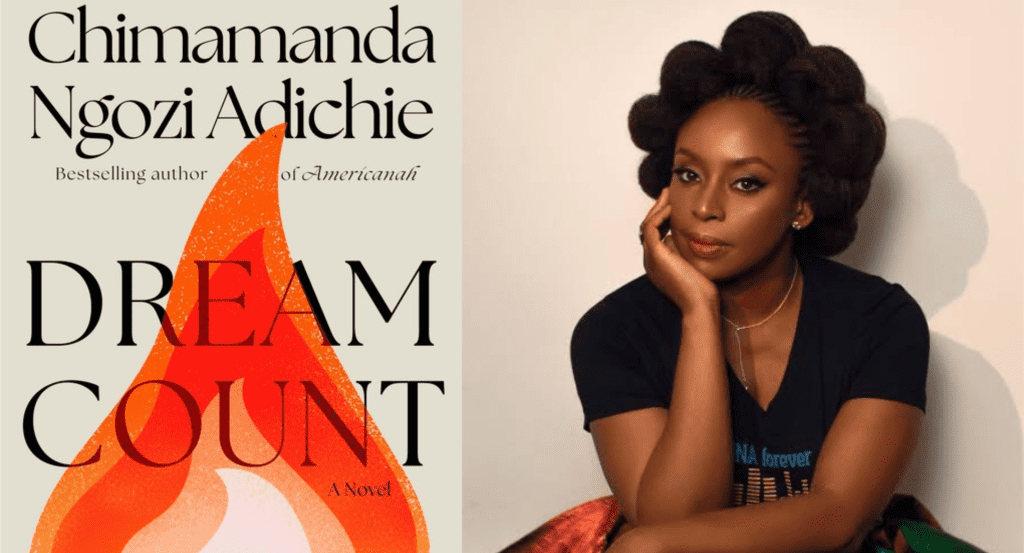Dream Count: Chimamanda Ngozi Adichie’s New Novel Arrives After 12 Years
After more than a decade since Americanah, award-winning Nigerian novelist Chimamanda Ngozi Adichie has released her latest book, Dream Count. This powerful novel intertwines the lives of four African women, offering an intimate and thought-provoking look at love, ambition, and societal expectations.
Dream Count: A Story of Four African Women
Dream Count follows the lives of four women whose experiences, challenges, and aspirations shape the novel’s compelling narrative. Set against the backdrop of the COVID-19 pandemic, the book blends past and present, revealing the women’s personal struggles and triumphs.
- Chiamaka – A Nigerian travel writer based in the US, searching for love while navigating personal and cultural expectations.
- Zikora – A lawyer also living in the US, dealing with the challenges of single motherhood after her partner leaves her.
- Kadiatou – A Guinean housekeeper who experiences trauma after a high-profile sexual assault, drawing inspiration from the real-life case of Nafissatou Diallo and Dominique Strauss-Kahn.
- Omelogor – A Nigerian banker who also runs a website advising men on life and relationships, while conducting research on pornography in the US.
Adichie weaves humor and emotional depth into these stories, exploring themes of love, friendship, and motherhood while addressing social issues such as misogyny, gender roles, and cultural expectations.
How Dream Count Expands Adichie’s Literary Legacy
Chimamanda Ngozi Adichie has long been known for centering Nigerian women in her storytelling. From Kambili in Purple Hibiscus to Ifemelu in Americanah, her characters have resonated with readers worldwide.
However, Dream Count takes a more direct approach to female experiences. The novel delves into physical and emotional aspects of womanhood, touching on topics like childbirth pain, fibroids, and the societal pressures imposed on women. It also highlights the complexities of relationships—romantic, platonic, and familial.
DON’T MISS THIS: Phillis Wheatley: The Trailblazing African American Poet Who Defied Oppression
One striking addition to Adichie’s literary style is her depiction of contemporary Abuja, including scenes involving drug use—an area she has rarely explored in previous works. This expansion of themes adds a fresh perspective to her storytelling while maintaining her signature wit and insight.
Was Dream Count Worth the Wait?
Absolutely. Dream Count is a richly layered novel that rewards patient readers willing to immerse themselves in its intricate storytelling. The book unfolds gradually, revisiting key events from multiple perspectives, offering a deeper understanding of its characters.
While Adichie’s signature humor and sharp social critique remain, Dream Count is particularly striking for its raw, unfiltered portrayal of women—showcasing their strength, vulnerability, frustrations, and resilience.
The Growing Importance of Love Stories in African Literature
Love is a universal theme, and in recent years, African literature has moved beyond stereotypical narratives of war, poverty, and corruption to embrace stories that explore human relationships in all their complexity.
Adichie herself has long criticized the Western literary world’s preference for “poverty porn”—works that focus exclusively on Africa’s struggles while ignoring its rich, diverse experiences. In Dream Count, she cleverly addresses this issue when Chiamaka pitches a travelogue idea to a white editor, only to be told to write about sexual violence in the Congo instead. This moment serves as a sharp critique of Western publishing’s narrow expectations of African storytelling.
However, as more African authors redefine their narratives, the literary landscape is shifting. Dream Count is a testament to this evolution, offering a compelling, deeply human story that embraces love, ambition, and resilience.
With Dream Count, Chimamanda Ngozi Adichie has once again proven why she is one of the most influential voices in contemporary literature. This novel is not just worth the wait—it’s essential reading.




















